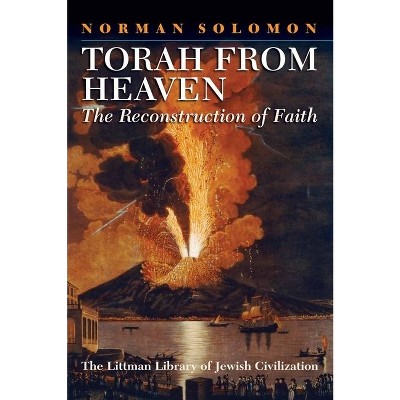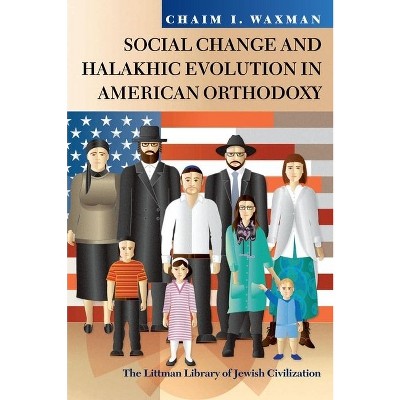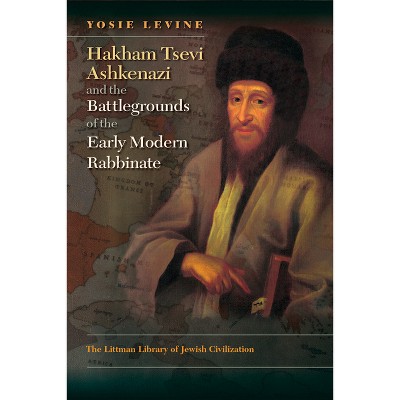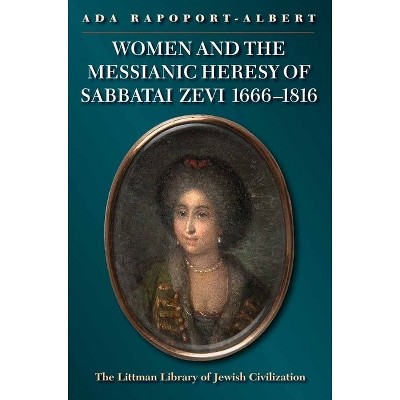LITTMAN Maimonides'Confrontation with Mysticism - (Littman Library of Jewish Civilization) by Menachem Kellner (Paperback)

About this item
Highlights
- Many books on Maimonides have been written and still more will appear.
- Author(s): Menachem Kellner
- 364 Pages
- Religion + Beliefs, Judaism
- Series Name: Littman Library of Jewish Civilization
Description
About the Book
Maimonides' vision of Judaism was deeply elitist, but at the same time profoundly universalistic. He was highly critical of the regnant Jewish culture of his day, which he perceived as so heavily influenced by ancient Jewish mysticism as to be debased. While focusing on that critique, Menachem Kellner skilfully and accessibly demonstrates how Maimonides used philosophy to purify a corrupted and paganized religion, and to present distinctions fundamental to Judaism as institutional, sociological, and historical, rather than ontological. In Maimonides' hands, metaphysical distinctions are translated into moral challenges.
Book Synopsis
Many books on Maimonides have been written and still more will appear. Few present Maimonides, as Menachem Kellner does against the actual religious background that informed his many innovative and influential choices. He not only analyses the thought of the great religious thinker but contextualizes it in terms of the 'proto-kabbalistic' Judaism that preceded him. Kellner shows how the Judaism that Maimonides knew had come to conceptualize the world as an enchanted universe, governed by occult affinities. He shows why Maimonides rejected this and how he went about doing it. Kellner argues that Maimonides' attempted reformation failed, the clearest proof of that being the success of the kabbalistic counter-reformation which his writings provoked.
Kellner shows how Maimonides rethought Judaism in different ways. It is in highlighting this and identifying Maimonides as a religious reformer that this book makes its key contribution. Maimonides created a new Judaism, 'disenchanted', depersonalized, and challenging; a religion that is at the same time elitist and universalist.
Kellner's analysis also shows the deep configuration of Judaism in a new light. If, as Moshe Idel says in his Foreword, Maimonides was able to 'reform so many aspects of rabbinic Judaism single-handedly, to enrich it by importing such dramatically different concepts, it shows that the profound structures of this religion are flexible enough to allow the emergence and success of astonishing reforms. The fact that, great as Maimonides was, he did not overcome the traditional forms of proto-kabbalism shows that the dynamic of religion is much more complex than subscribing to authorities, however widely accepted.'
Review Quotes
'One of the most important books on Maimonides to be published in the last thirty years and quite possibly one of the most important in the field of Jewish philosophy. The writing is clear and crisp, and the scholarship is impeccable. The book explains not just how radical Mamonides's dissatisfactions with the Judaism of his day was, but how radical his opinions are for most Jews today.'
Kenneth Seeskind, AJS Review
Allan Nadler, Forward 'Kellner has contributed a study of great value not only for an academic audience but for lay and yeshivish audiences as well. The book is a welcome addition to the samizdats currently circulating within the underground yeshiva counter-culture.'
James A. Diamond, Meorot 'A spirited, highly stimulating works that reads fluently and fully engages not only with the mind but also the reader's Jewish soul.'
Haim Chertok, Midstream 'Interesting and important... extremely valuable in the way that it roots both Maimonides' legal code and his philosophy in the thought-world and social and religious practices of his own time, and dramatizes the ways in which some of his most characteristic formulations function as critical responses to what prevailed in his own culture and environment.'
Aryeh Botwinick, Philosophy East & West 'One of those rare combinations of erudite scholarship and accessible style, treating an issue that is not only perennially meaningful, but also particularly salient today-features that characterize a number of his works... Throughout the book, Kellner devises a series of easy-to-follow dualities to structure his argument... many books have been written about Maimonides. What Menachem Kellner's book does uniquely is to isolate the ways in which Maimonides bumps against the mystical and mythical strains that run through ancient and medieval Jewish thought like a river. While any educated Jew knows that Maimonides stands out as a leading rationalist, Kellner presents us with a compelling portrait of the multi-faceted ways in which Maimonides expunges these mystical and mythical veins from the Jewish mine.'
Joel Hecker, The Reconstructionist 'Kellner has refocused Maimonidean studies in a new way. In addition, he has done so in a very learned manner: his footnotes cover a vast area of Jewish scholarship; his summaries of scholarship are very concise; and his bibliography is very full... a very important book. It formulates clearly and comprehensively the hyperrationalist reading of Maimonides which is widely held by scholars of Jewish philosophy. It also offers a new proposal on the subject of the opponents against whom Maimonides wrote. Kellner's erudition has made this so, and his willingness to engage the present and the future has projected the issue beyond medieval philosophy.'
David R. Blumenthal, Reviews in Religion & Theology 'The strengths of this book lie in its didactic and ideological clarity... For those interested in the medieval roots of a major dispute within modern Orthodox Judaism this is an extremely useful book packed with detailed examples of contentious topics.'
Michael Fagenblat, Speculum 'A thought-provoking study that deals with rather more than its title suggests.'
Jeremy Adler, Times Literary Supplement 'Perhaps no author in the last couple of decades has made Maimonides' theology more relevant for contemporary Orthodox dialogue than Menachem Kellner. His works on dogma, belief, rabbinic authority, and other central topics have generated significant debate and even his biggest detractors acknowledge the substantive and stimulating nature of his work... This is an extremely thought-provoking work that deserves serious attention, debate, and discussion.'
Tradition Online 'Intellectual tour de force... On the one hand, Kellner, in a work of objective scholarship, insightfully decodes what he takes to be two opposing religions that have contended for recognition as the Orthodox expression of Judaism from ancient to modern times. On the other hand, Kellner, as an engaged modern Orthodox thinker who has a stake in this conflict, applies wide learning, critical skills, and expansive control of traditional Jewish sources, intellectual history, and analytic philosophical tools in a sustained argument... Menachem Kellner's study of Maimonides and the mystics will endure not because it explicates an antiquarian medieval debate; his study talks to moderns who struggle with ideas and ideals, who are both intellectually modern and Jewishly religious.'
Alan J. Yuter, Review of Rabbinic Judaism
'This is one of the most important books on Maimonides to be published in the last thirty years and quite possibly one of the most important in the field of Jewish philosophy. The writing is clear and crisp, and the scholarship is impeccable.'
Israel Book Review











